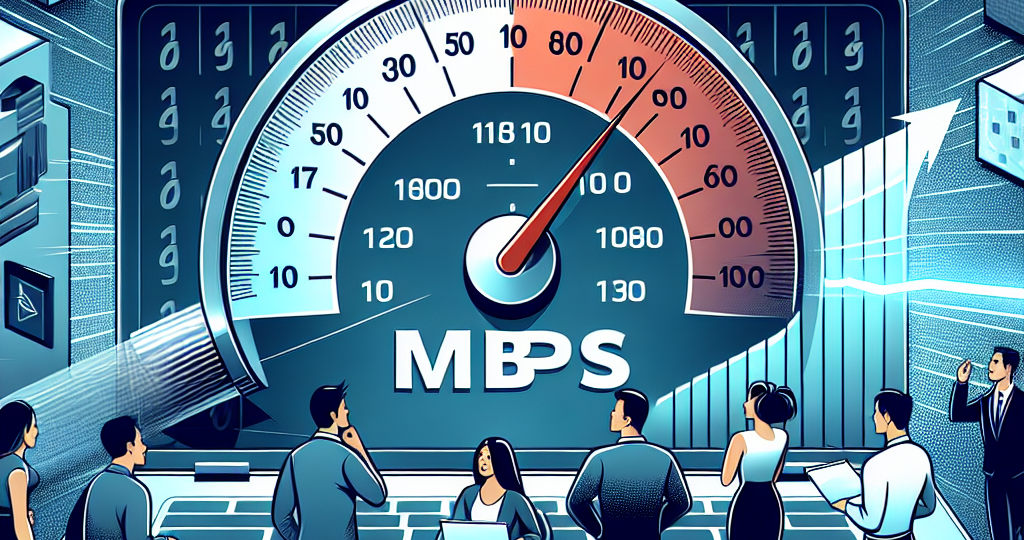
When it comes to internet speed, the term Mbps is often thrown around. But what exactly does Mbps mean? Mbps stands for megabits per second, and it is the measure of how fast data can be transferred over a network. In simpler terms, it determines how quickly you can download or upload content online. The higher the Mbps, the faster your internet connection will be. Understanding what Mbps means can help you make informed decisions when selecting internet plans and ensuring you have a smooth and efficient online experience. Let’s dive deep into the world of internet speed and uncover the importance of Mbps.
Mbps stands for Megabits per second and it is a unit used to measure the speed of an internet connection. It represents the rate at which data is transferred over the network, with higher Mbps indicating faster speeds. The higher the Mbps, the quicker you can download or upload data, stream videos, and perform other online activities.
Understanding Mbps

– Definition of Mbps
– Mbps stands for megabits per second, which is a unit used to measure data transfer speed over a network, such as the internet.
– It indicates how many megabits of data can be transmitted in one second.
- How Mbps is Measured
- Mbps is measured by calculating the amount of data that can be transmitted in one second.
- This measurement helps determine the speed at which data can be downloaded or uploaded from the internet.
- Importance of Mbps in Internet Speed
- Mbps is crucial in determining the speed and performance of an internet connection.
- The higher the Mbps, the faster the data can be transferred, resulting in quicker loading times for websites, smoother streaming of videos, and faster downloads of files.
Factors Affecting Internet Speed
When considering internet speed, several factors come into play that can impact the Mbps rate experienced by users. Understanding these factors is crucial in optimizing internet performance for efficient browsing, streaming, and downloading.
-
Bandwidth vs. Mbps
Bandwidth and Mbps are often used interchangeably when discussing internet speed, but they represent different aspects of the connection. Bandwidth refers to the maximum rate at which data can be transferred, while Mbps (megabits per second) specifically quantifies the speed of data transfer. Therefore, having a high bandwidth does not necessarily guarantee high Mbps if the network is congested or the connection type limits the speed.
-
Connection Type Impact on Mbps
The type of connection utilized also plays a significant role in determining the Mbps rate. Different connection types, such as DSL, cable, fiber-optic, and satellite, offer varying speeds and performance levels. Fiber-optic connections typically provide the highest Mbps rates due to their advanced technology and superior bandwidth capacity, while satellite connections may experience latency issues that impact Mbps, especially in remote areas.
-
Network Congestion and Mbps
Network congestion can severely affect Mbps rates, particularly during peak usage times when many users are simultaneously accessing the internet. When the network is congested, data packets may experience delays in transmission, leading to reduced Mbps and slower internet speeds for users. Providers often monitor and manage network congestion to maintain optimal performance levels and ensure consistent Mbps rates for their customers.
Understanding Mbps (megabits per second) is crucial for determining internet speed. The higher the Mbps, the faster data can be transferred, leading to quicker loading times, smoother video streaming, and faster downloads. Factors such as connection type, network congestion, and device performance can impact Mbps rates and overall internet speed. To improve Mbps for better speed, consider upgrading internet plans for higher Mbps, optimizing Wi-Fi networks, and troubleshooting slow connections.
Real-Life Examples
When considering internet speed in terms of Mbps, it’s important to understand how it impacts various real-life activities. Here are some examples:
- Mbps Requirements for Different Activities
- Streaming content in high definition typically requires a minimum of 5 Mbps for a smooth viewing experience. However, for 4K ultra-high-definition content, speeds of at least 25 Mbps are recommended to prevent buffering and ensure optimal quality.
- Video conferencing platforms like Zoom or Microsoft Teams generally need around 3-4 Mbps for a stable connection and clear video and audio quality.
- Online browsing and social media usage have lower bandwidth requirements, with basic web surfing needing as little as 1 Mbps for decent performance.
- How Mbps Impacts Streaming Quality
- The higher the Mbps, the faster the download speed, which directly translates to better streaming quality. With higher Mbps, users can enjoy smoother playback, faster loading times, and less buffering while watching videos or movies online.
- Insufficient Mbps can result in pixelated or blurry video quality, frequent pauses for buffering, and overall frustration for users trying to stream content.
- Recommended Mbps for Online Gaming
- Online gaming is particularly sensitive to internet speed, with different games requiring varying Mbps for optimal performance. For example, fast-paced shooter games like Fortnite or Call of Duty may need speeds upwards of 10-20 Mbps to prevent lag and ensure responsive gameplay.
- Massive multiplayer online role-playing games (MMORPGs) often demand higher Mbps due to the constant exchange of data between players and servers. Speeds of 25 Mbps or more are recommended for a seamless gaming experience without disruptions.

Debunking Common Myths
In the realm of internet speed, there are several common myths that often lead to misconceptions among users. By debunking these myths, a clearer understanding of what Mbps truly means for internet speed can be achieved:
- More Mbps = Faster Internet?
Contrary to popular belief, having a higher Mbps (megabits per second) does not always guarantee a faster internet connection. While Mbps does play a significant role in determining the speed of your internet connection, it is not the sole factor. Other elements such as network congestion, latency, and the quality of your router also influence the overall speed and performance of your internet connection.
- Mbps vs. Ping: Clarifying the Difference
Another common misconception is the confusion between Mbps and ping. Mbps refers to the rate at which data is transferred over your internet connection, whereas ping measures the response time between your device and a server. While Mbps indicates how quickly you can download or upload data, ping is more about the responsiveness of your connection. A high Mbps does not necessarily translate to a low ping, and vice versa.
- Mbps and Device Performance

It is important to note that Mbps primarily impacts the speed at which data is transferred to and from your device. However, the performance of your device, such as its processing power, RAM, and storage capacity, also plays a crucial role in determining your overall internet experience. A high Mbps may not necessarily improve the performance of a slow or outdated device, as the device’s capabilities can act as a bottleneck to the internet speed.
Improving Mbps for Better Speed
In the quest for faster internet speed, there are several strategies you can employ to enhance your Mbps for a smoother online experience:
- Upgrading Internet Plans for Higher Mbps: One of the most straightforward ways to boost your internet speed is by upgrading your current plan to one with higher Mbps. Internet service providers offer a range of packages with varying Mbps speeds, so selecting a plan that aligns with your usage habits can significantly improve your online experience.
- Optimizing Wi-Fi for Maximum Mbps: To maximize the Mbps you receive, optimizing your Wi-Fi network is crucial. Simple steps such as proper router placement, minimizing interference from other devices, and ensuring your equipment is up to date can all contribute to a more stable and faster connection.
- Troubleshooting Slow Mbps Connections: If you’re experiencing sluggish internet speeds despite having a high Mbps plan, troubleshooting your connection can help identify and resolve the issue. This may involve checking for background downloads, updating firmware on your devices, or contacting your ISP for assistance in diagnosing any potential issues affecting your Mbps speeds.
FAQs – What Does Mbps Mean for Internet Speed
What does Mbps stand for?
Mbps stands for megabits per second and is a unit of measurement used to describe the speed of an internet connection. It represents how quickly data can be transferred over a network.
How does Mbps impact my internet speed?
The higher the Mbps, the faster your internet speed will be. Higher Mbps allows for quicker downloads, smoother streaming, and faster loading times for websites.
What Mbps speed do I need?
The Mbps speed you need depends on your internet usage habits. For general browsing and light streaming, a speed of 25 Mbps should be sufficient. However, for heavy streaming, online gaming, or multiple devices connected at once, you may want to consider speeds of 100 Mbps or more.
How can I test my Mbps speed?
There are various websites and apps available that allow you to test your internet speed. Simply search for “internet speed test” and follow the instructions to see your current Mbps speed. This will give you an idea of how fast your connection is performing.
Can my internet provider increase my Mbps speed?
Yes, many internet providers offer different speed packages that you can choose from based on your needs. If you find that your current speed is not sufficient, you can contact your provider to upgrade to a faster plan.
RELATED POSTS
View all

